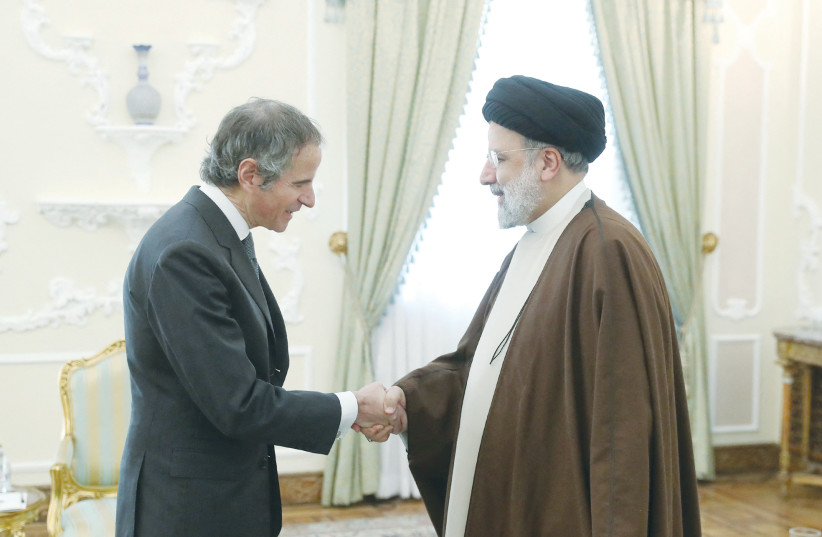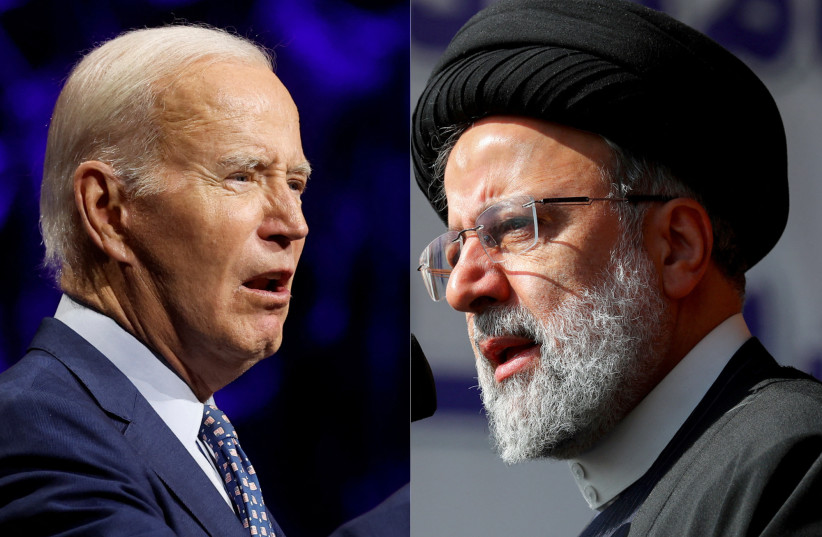PM Benjamin Netanyahu has repeatedly said that any deal between Washington and Tehran will not stop Jerusalem from taking steps against a nuclear Iran.
LAHAV HARKOVJUNE 17, 2023 21:29JUNE 17, 2023 22:05

The key objective of the impending nuclear deal between the US and Iran is to stop Israel from attacking Iran, a Western official told Reuters.
“If [the] Iranians miscalculate, the potential for a strong Israeli response is something that we want to avoid,” the official said.
The Prime Minister’s Office declined to comment.
Prime Minister Benjamin Netanyahu has repeatedly said that any deal between Washington and Tehran will not stop Jerusalem from taking steps against the threat of a nuclear Iran.
“Our stance is clear: No agreement with Iran will oblige Israel,” Netanyahu said in the Knesset last week. “Israel will continue to do everything to defend itself.”

US President Joe Biden and Iranian President Ebrahim Raisi. (credit: Iran’s President Website/WANA (West Asia News Agency)/Handout via REUTERS, REUTERS/JONATHAN ERNST)
Knesset Foreign Affairs and Defense Committee chairman Yuli Edelstein said on Saturday night that “Israel can live with the ‘mini-agreement’ because there is oversight.”
“Iran is a nuclear threshold state and is becoming soundly established as such,” Edelstein said.
He warned that “Iran is gaining abilities [and] Ukraine became an excellent platform for testing them…We need to keep an eye on this.”
What does the expected deal contain?
The US and Iran negotiated the expected deal in recent weeks via Oman, after talks to revive the 2015 nuclear agreement failed last year. The new agreement, which is expected to be a series of unwritten understandings, would have the US provide sanctions relief in exchange for Iran limiting its nuclear program.
It would have Iran halt its uranium enrichment at 60% purity, far beyond the 3.67% permitted in 2015, but below the 90% needed for a nuclear weapon. The US warned in the talks that it would exact a heavy price from Iran if it enriches to 90%.
Iran would also free Americans it is holding in prison, stop selling ballistic missiles to Russia and stop its proxies’ attacks on US contractors in Syria and Iraq, according to The New York Times.
The US would waive nearly $20 billion in sanctions, and not add further sanctions or pursue resolutions against Iran in the UN Security Council or the International Atomic Energy Agency.
The Biden administration has sought to reach informal understandings with Iran, rather than a written agreement, to circumvent the Iran Nuclear Agreement Review Act (INARA), which requires the president to give Congress the text of any deal regarding Iran’s nuclear program and triggering a 30-day review period.
US House of Representatives Foreign Affairs Committee Chairman Michael McCaul, a Republican, wrote to Biden, a Democrat, on Thursday, saying “any arrangement or understanding with Iran, even informal, requires submission to Congress.”
State Department spokesperson Matt Miller denied there was any deal with Iran.
“We continue to use diplomatic engagements to pursue all of these goals.”
State Department spokesman Matt Miller
However, Miller said the United States wants Iran to de-escalate tensions and curb its nuclear program, cease support for regional proxy groups that carry out attacks, halt support for Russia’s invasion of Ukraine and release detained American citizens.
“We continue to use diplomatic engagements to pursue all of these goals,” Miller added, without giving details.
An Iranian official told Reuters, “call it whatever you want, whether a temporary deal, an interim deal or a mutual understanding – both sides want to prevent further escalation.”
Meanwhile, Saudi Foreign Minister Prince Faisal bin Farhan visited Iran on Saturday.
Prince Faisal called for “cooperation among all regional countries to ensure that it is free of weapons of mass destruction.”
Speaking after talks with his Iranian counterpart Hossein Amirabdollahian in Tehran, Prince Faisal also said the Saudi king and crown prince are looking forward to Iranian president Ebrahim Raisi “accepting the invitation to visit the Kingdom soon, God willing.”
Iran and Saudi Arabia agreed in March, in a deal brokered by China, to end a diplomatic rift and reestablish relations following years of hostility that had endangered regional stability including in the Gulf, Yemen, Syria and Lebanon.
Amirabdollahian told a televised joint media event that security was vital for regional countries.
“Iran has never equated security with militarism but sees it as a broad concept including political, cultural, social, economic and trade aspects,” he said.
Content retrieved from: https://www.jpost.com/middle-east/article-746663.